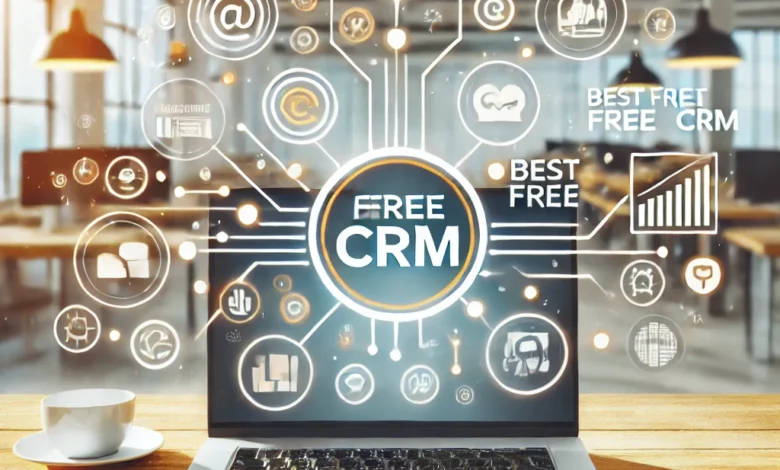The Ultimate Guide to Finding the Best Free CRM for Your Business

In today’s fast-paced business environment, managing customer relationships efficiently is crucial to success. As businesses of all sizes strive to maintain meaningful connections with their clients, the need for a robust Customer Relationship Management (CRM) system has become more evident than ever. While there are numerous options available, finding the best free CRM can be a game-changer, especially for small businesses and startups that need to optimize their customer interactions without breaking the bank.
Understanding the Importance of CRM in Business
A CRM system serves as the backbone of a business’s customer interaction strategy. It helps businesses organize, track, and manage their interactions with current and potential customers. With a well-implemented CRM, companies can streamline their processes, improve customer satisfaction, and ultimately drive sales growth.
But what makes a CRM system so essential? Here are a few key benefits:
- Centralized Data Management: CRMs store all customer information in one place, making it easy for businesses to access and manage data efficiently.
- Improved Communication: A CRM system allows teams to share information seamlessly, ensuring everyone is on the same page when it comes to customer interactions.
- Enhanced Customer Experience: By tracking customer preferences and interactions, businesses can tailor their services to meet individual needs, leading to higher customer satisfaction.
- Increased Sales and Revenue: A well-organized CRM helps businesses identify sales opportunities, track leads, and convert them into loyal customers.
To get free CRM software visit https://www.ringcentral.com/apps/friday-crm
What to Look for in the Best Free CRM
Choosing the best free CRM for your business involves evaluating several key features that can make a significant difference in your customer management efforts. While each business may have unique needs, the following features are essential for any CRM system:
- Ease of Use: The CRM should have an intuitive interface that allows users to navigate and utilize its features without extensive training. A user-friendly CRM ensures that your team can focus on building customer relationships rather than struggling with the software.
- Contact and Lead Management: A good CRM allows you to store and manage all your customer contacts and leads in one place. This feature is crucial for tracking interactions and following up with potential clients.
- Automation: Automation tools within a CRM can save time and reduce human error by handling repetitive tasks such as sending follow-up emails, scheduling meetings, and updating contact information.
- Customization: Every business is different, so your CRM should offer customizable features that allow you to tailor the system to your specific needs. This could include custom fields, tags, or pipelines that align with your business processes.
- Integration: The best free CRM should integrate seamlessly with other tools and software you use, such as email, marketing platforms, and social media. This ensures a smooth workflow and eliminates the need for manual data entry.
- Reporting and Analytics: To make informed business decisions, your CRM should provide robust reporting and analytics tools. These features help you track performance, identify trends, and measure the success of your customer management strategies.
- Mobile Access: In today’s mobile-driven world, having access to your CRM on the go is essential. A good CRM should offer a mobile app or a responsive design that allows you to manage customer relationships from any device.
- Scalability: As your business grows, your CRM needs will evolve. The best free CRM should offer scalability options, allowing you to upgrade to more advanced features or a paid version as your business expands.
Maximizing the Value of a Free CRM
While a free CRM can offer significant value to your business, it’s essential to approach it with the right mindset and strategy. Here are some tips to help you maximize the benefits of your free CRM:
- Set Clear Objectives: Before implementing a CRM, define what you want to achieve with it. Whether it’s improving customer retention, increasing sales, or streamlining communication, having clear objectives will guide your CRM usage and help you measure success.
- Train Your Team: Even the most user-friendly CRM requires some level of training. Ensure that your team understands how to use the CRM effectively and is aware of its features and benefits.
- Customize the CRM to Your Needs: Take advantage of the customization options offered by your CRM to align it with your business processes. This will ensure that the system works for you, not the other way around.
- Regularly Update Data: A CRM is only as good as the data it contains. Make it a habit to update customer information regularly to keep your database accurate and useful.
- Monitor Performance: Use the CRM’s reporting and analytics tools to track your progress and identify areas for improvement. Regular monitoring will help you stay on top of your customer management efforts and make data-driven decisions.
The Impact of the Best Free CRM on Different Business Sectors
The versatility of a CRM system makes it valuable across various industries. Here’s how different sectors can benefit from implementing the best free CRM:
- Retail: In the retail sector, a CRM helps businesses manage customer relationships, track sales, and personalize marketing efforts. Retailers can use CRM data to create targeted promotions and improve customer loyalty.
- Real Estate: For real estate professionals, a CRM is essential for managing client information, tracking property listings, and coordinating showings. It also helps agents stay in touch with clients and nurture long-term relationships.
- Healthcare: Healthcare providers use CRM systems to manage patient information, schedule appointments, and follow up on treatment plans. A CRM can improve patient care by ensuring that healthcare providers have access to accurate and up-to-date information.
- Financial Services: In the financial sector, a CRM helps businesses manage client portfolios, track investment opportunities, and maintain compliance with regulations. Financial advisors can use CRM data to provide personalized advice and build trust with clients.
- Education: Educational institutions use CRM systems to manage student information, track enrollment, and communicate with prospective students. A CRM can streamline admissions processes and improve student engagement.
- Non-Profit Organizations: Non-profits use CRM systems to manage donor relationships, track fundraising efforts, and organize volunteer activities. A CRM can help non-profits increase their impact by improving donor engagement and campaign management.
Overcoming Common Challenges with Free CRMs
While the best free CRM can offer numerous benefits, it’s important to be aware of potential challenges and how to overcome them:
- Limited Features: Free CRMs may have limited features compared to paid versions. To overcome this, prioritize the features that are most important to your business and consider integrating additional tools if necessary.
- Data Limitations: Some free CRMs have limitations on the amount of data you can store. To avoid running out of space, regularly clean your database by removing outdated or irrelevant information.
- Lack of Customer Support: Free CRMs may offer limited customer support. To mitigate this, take advantage of online resources such as tutorials, forums, and user communities to troubleshoot issues and learn best practices.
- Scalability Concerns: As your business grows, you may outgrow the features offered by a free CRM. Be prepared to upgrade to a paid version or explore other CRM options if necessary.
The Future of Free CRMs
As technology continues to evolve, the future of free CRMs looks promising. Here are some trends to watch for:
- AI and Automation: The integration of artificial intelligence and advanced automation features will make CRMs even more powerful. Expect to see more AI-driven insights, predictive analytics, and automated workflows in the coming years.
- Enhanced Mobile Access: As mobile usage continues to rise, free CRMs will likely offer improved mobile functionality, making it easier for businesses to manage customer relationships on the go.
- Increased Customization: The demand for personalized experiences will drive CRM providers to offer more customization options, allowing businesses to tailor their CRM systems to their specific needs.
- Better Integration: As businesses rely on a growing number of tools and platforms, free CRMs will likely offer improved integration capabilities, creating a seamless workflow across different systems.
Conclusion
Finding the best free CRM for your business can be a transformative decision, enabling you to manage customer relationships more effectively and drive growth. By carefully evaluating your options and focusing on the features that matter most to your business, you can implement a CRM system that meets your needs without straining your budget.
Remember, while free CRMs offer a great starting point, it’s important to stay flexible and open to upgrading as your business evolves. With the right CRM in place, you’ll be well-equipped to build stronger customer relationships, improve efficiency, and achieve your business goals.




